|
|
|
Sort Order |
|
|
|
Items / Page
|
|
|
|
|
|
|
| Srl | Item |
| 1 |
ID:
128563
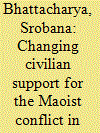

|
|
|
|
|
| Publication |
2013.
|
| Summary/Abstract |
Prolonged domestic political conflicts change over time. The Maoist conflict in India which began in the late 1960s is one such conflict. Over time, the 'old' Maoist conflict has become a 'new' Maoist conflict. Important changes have occurred both in the macro and micro processes of the conflict. Some of these changes include the strategic relocation of the Maoist bases, a shift in the class character of the conflict, the nature of civilian support, and the rebels' methods of operation. While in the 1960s, the conflict was involved in land redistribution with the aim of annihilating class enemies, the recent conflict focuses on caste identities. In addition, it is intrinsically linked with territorial control and local political competition. This has automatically led the Maoists to become involved with local criminal networks and also local business networks based. This involvement has led to financial resources for the conflict. Furthermore, it has forced the local population to become linked with the conflict. Studying these changes is important, especially for counterinsurgency policies.
|
|
|
|
|
|
|
|
|
|
|
|
|
|
|
|
| 2 |
ID:
168218
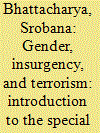

|
|
|
| 3 |
ID:
157480
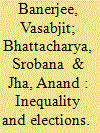

|
|
|
|
|
| Summary/Abstract |
This article investigates the causes of India's Maoist insurgency and its changing dynamics. To explain its origins, we empirically test three hypotheses using cross-state-level data: inequality of wealth in states; inefficient state government; and, disgruntled provocateurs. Our analysis reveals that insurgency is caused by inequality of wealth in states, not inefficient state governments and disgruntled provocateurs. Subsequently, we study variations in the number of Maoist attacks and the selected targets in the eastern Indian state of West Bengal using newspaper reports of events. Our analysis demonstrates that the numbers of incidents and the type of targets selected depend on electoral competition between regional political parties and their interactions with Maoists. The findings, therefore, indicate that whereas inequality of wealth can explain the insurgency's presence in states, political competition within states could explain its dynamics.
|
|
|
|
|
|
|
|
|
|
|
|
|
|
|
|
| 4 |
ID:
134803
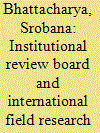

|
|
|
|
|
| Summary/Abstract |
Research on political conflict can benefit immensely from fieldwork. However, the Institutional Review Board (IRB) process is elaborate and daunting that discourages rather than encourages this type of research. Existing policies often are insensitive to the many uncertainties related to field research abroad, especially in conflict zones. Three reasons for this are identified in this article. First, the federal regulations to protect human subjects of social science research are most suitable for biomedical sciences. Second, there is huge gap between “procedural ethics” and “ethics in practice.” Third, there is a lack of communication or dialogue between researchers and IRBs. After discussing these reasons, I offer the following suggestions: bridging the gap between the researcher and the IRB; reducing delays in the IRB approval and revision process; encouraging collaboration and dialogue among researchers; and advocating a proactive stance by academic associations.
|
|
|
|
|
|
|
|
|
|
|
|
|
|
|
|
| 5 |
ID:
121895
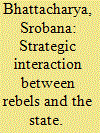

|
|
|
|
|
| Publication |
2013.
|
| Summary/Abstract |
The "people's war" in Nepal during 1996-2006, led to two significant outcomes-the elimination of monarchy and political victory for the Maoists. These political outcomes raise important questions about the process of Maoist conflict in Nepal. While several studies on political conflict are concerned about "why" such conflicts happen, I focus on "how" the strategy of conflict unfolded in Nepal. In this article, I argue that strategic interaction between rebels and the state explain why the conflict led to negotiated settlement in Nepal. To discuss the sequence of rebel-state interaction, I introduce a game theoretic model. In addition, I show how territorial control, target selection, and levels of violence used by the rebels in comparison to the state are crucial in understanding the conflict process. The case study in this article analyzes the relevance of rebel-state interaction to reveal micro processes of political conflict and further suggests that negotiation can become an important tactical choice in resolving conflict.
|
|
|
|
|
|
|
|
|
|
|
|
|
|
|
|
|
|
|
|
|